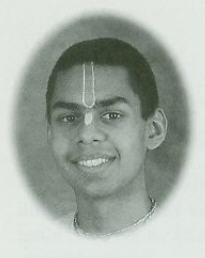
Ravi Gupta
ONE DAY A COLLEGE student came up to me and said, "You know, what I like about India and Indian culture is that they face the miseries of life head-on. While we in the West try to hide from death, in India people prepare for it."
Of the four basic miseries of life birth, death, disease, and old age death is the most fearful. A person can recover from a disease or remain fit and healthy even in old age, but there's no stopping death.
Nothing is as sure and as frightening as death, but how we face it makes the difference. In a materialistic culture, we try to forget about the reality of death. Emergency teams quickly cover up victims. Hospitals bear hardly a sign of death.
For a culture based on the body, death is not a pleasant thought. People stay absorbed in their bodies, hoping death will never arrive.
In the Vedic culture of India, people see life as a preparation for death. The Vedic scriptures are full of stories of great saintly kings who renounced their kingdoms and opulence to prepare for the final test.
Cursed to die in seven days, King Pariksit left his global empire and went to the bank of the Ganges. There, in an assembly of great saintly persons, he inquired from Srila Sukadeva Gosvami, "You are the spiritual master of great saints and devotees. I am therefore begging you to show the way of perfection for all persons, and especially one who is about to die."
The great scripture Srimad-Bhagavatam is Sukadeva's response to Pariksit's request.
The Vedic social system prepares a person for death by dividing life into four periods. The first twenty-five years are spent studying under the spiritual master, the next twenty-five in family life. At age fifty, husband and wife gradually detach themselves from the family and spend more time away from home in spiritual pursuits. Finally, for the last part of their lives they separate and become absorbed in serving the Lord.
Lord Krsna says that as death He takes everything away. But by detaching ourselves voluntarily we reduce the pain and shock. People in India still try to develop detachment before dying. Many travel to places of pilgrimage, settle in a holy place to die, or fast several weeks before death.
The Vedic teachings of karma and reincarnation put crucial importance on the moment of death. As Lord Krsna says in the Bhagavad-gita (8.6), "Whatever state of being one remembers when he quits his body, O son of Kunti, that state he will attain without fail." Our consciousness at the end of this life determines our next. By preparing for death, we prepare for our next birth.
When I go to India, modernized Indians sometimes ask my parents why they trouble their children with such issues as death, miseries, renunciation, spiritual regimen, and so on. "Theirs is a time to be optimistic and carefree. Deep spiritual questions and practices can come later."
But as the great devotee Prahlada Maharaja told his five-year-old classmates, the preparation must start now. Otherwise, the early years of life are lost in play, youth in education and marriage, middle age in raising children and maintaining a household, and old age in keeping up with the body. To be ready for death, we must find the time to prepare now. Accepting and preparing for death are the best way to put an end to the painful cycle of birth, death, disease, and old age.
Death can serve as a catalyst for escaping reincarnation. Lord Krsna says in the Bhagavad-gita (8.5, 13), "Whoever at the end of his life quits his body remembering Me alone at once attains my nature. Of this there is not doubt. … After attaining Me, the great souls, who are yogis in devotion, never return to this temporary world, which is full of miseries, because they have attained the highest perfection."
Because devotees of the Lord spend their entire life serving and remembering Krsna, they are sure of their destination and so have nothing to fear from death. When a cat catches a mouse, the cat's jaws terrify the mouse. But when the cat picks up her kittens, those same jaws are the most secure place. Similarly, for the materialist death is most fearful. But for the devotee of the Lord it is simply a call back home, back to Godhead.
Ravi Gupta, age fifteen, lives at the Hare Krsna center in Boise, Idaho, USA. The center is run by his parents. Ravi, who was schooled at home, is a third-year student at Boise State University.
